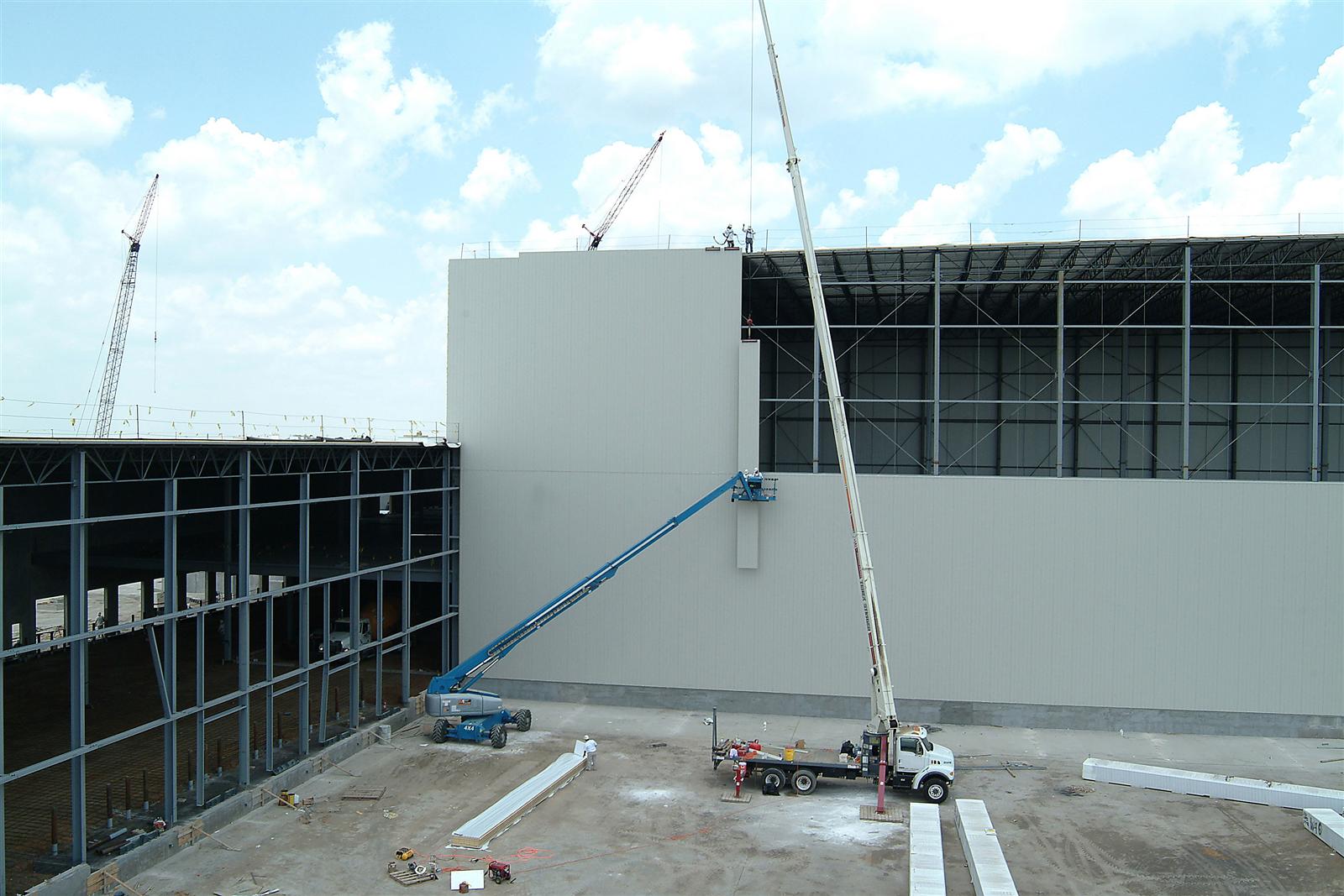Insulated metal panels (IMPs) installed on a building exterior provide an excellent thermal envelope. In contrast to other envelope assemblies, IMPs more effectively reduce thermal bridging. With the industry continually striving to build more sustainable designs, IMPs are by far the best and most thermally efficient product available today.
Panels are typically double tongue and groove with the highest R-values per inch of any insulation material used in construction today. The facings are available in USDA-approved white, galvanized, and stainless steel, which make them a great choice for food processing facilities.
IMP walls offer six significant benefits over traditional materials, including:
1. Installation — IMPs (a single-component system) increase project build speed, minimize delays and decrease the need for multiple trades. Their solid, lightweight nature makes them easier to maneuver and position. They can be installed in all weather conditions and perform effectively in all seismic zones.
2. Integrity — IMPs have a closed seam at the side joinery, which makes them the ideal choice in food processing construction, providing owners with the easiest panel to face seal. Panels for cold storage construction include minor profiling in the facings (while providing required structural integrity and flatness tolerances) to make it easier to apply vapor barrier tapes and sealants for freezer application, eliminating the need for deep ribs that can allow the possibility of air and water vapor leaks. Closed cell polyisocyanurate insulation and self-aligning, double inter-locking tongue and groove joints with concealed fasteners create an airtight and watertight seal to stabilize interior environments.
3. Energy efficiency — IMP walls provide superior thermal insulation capabilities specifically engineered to maintain interior climate control regardless of external weather conditions.
4. Sanitation — IMP walls provide a more sanitary finish that can easily be washed down and withstand harsh chemical cleaning. IMP walls also meet plant owner’s needs for a more sanitary surface at floor and curb levels.
5. Maintenance — Because inside plant walls can be damaged by large equipment and machinery, insulated metal panel walls provide easier repair solutions that can be completed in a cosmetically appealing and hygienic manner.
6. Sustainable — IMPs include a minimum 30 percent recycled steel content, making them 100 percent recyclable and reusable, contributing to LEED credits and Net-Zero Energy targets.
To learn more about the benefits of IMPs for your plant’s walls, email me at foodforthought@stellar.net.




Dear Kevin
Has fire behavior data of IMPs panels?
Eduardo Hernández
Technical University of Catalonia (Spain)
Hey Eduardo, I’ll contact you via email and send you more information. Thank you for asking.
Kevin
Hi Kevin,
I was wondering if this kind of walls would be good for dry clean up I work for a almond processor and they are building a new processing facility, here we do not use water to do sanitation because of the risk of Salmonella, a dry cleaning method is needed but we have the natural oils from the almond and also a lot of the almond dust, would you say this would be a good material for our interior walls?Most of our cleaning consist of Quaternary cleaning (Alcohol based) sanitizing agents .
Ofelia,
While denatured alcohol (ethanol) or isopropyl (rubbing alcohol) have no adverse effects on polyester paint finishes, quaternary sanitizing agents typically refer to ammonium chlorides. Quaternary ammonium chemicals might require a more resistant surface, but we’d still want to have the SDS to verify. Feel free to send us a SDS sheet on chemicals used!
Hi Kevin,
I have a small startup for RTD tea, I found this site useful. I’m building a small facility to brew the tea (water and powders) and auto-fill the bottles. I have a few thousand sf warehouse space available for the operation but it is a lease so I’m thinking that instead of converting the large space to food level manufacturing I would prefer to use a prefab room size 20’ x 40’ x 10’ H
I’m going to use this room for boiling tea in a large kettle and automatically fill bottles. Can you please advise what will be the way to go about it: specific materials? recommended manufacturer?
Thank you very much in advance for your help
Hi Hen, There are several “walk in cooler” manufacturers that offer a pre-fab room the size you’re looking for. One in particular is Kolpak. There is a sales locator tool on the website: http://www.kolpak.com/Products/Coolers-Freezers Let us know if you have any other questions!